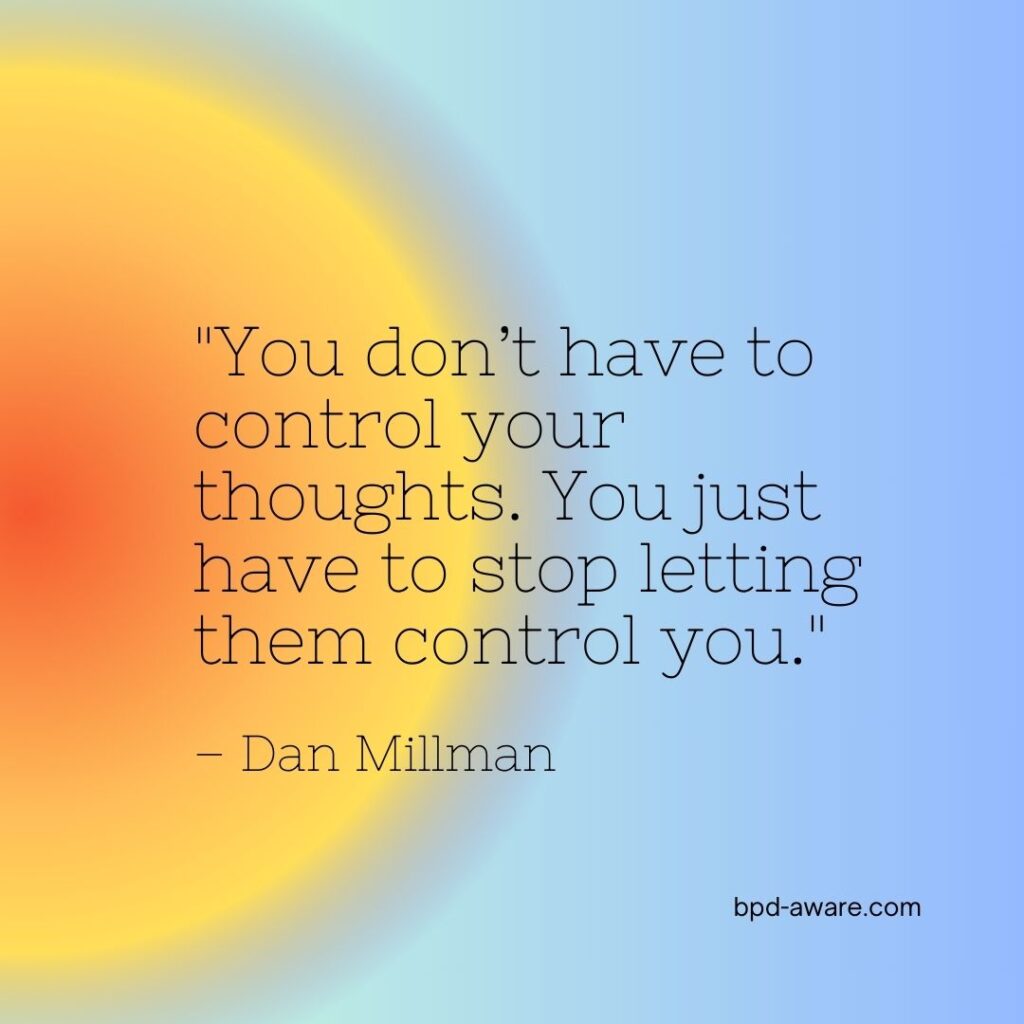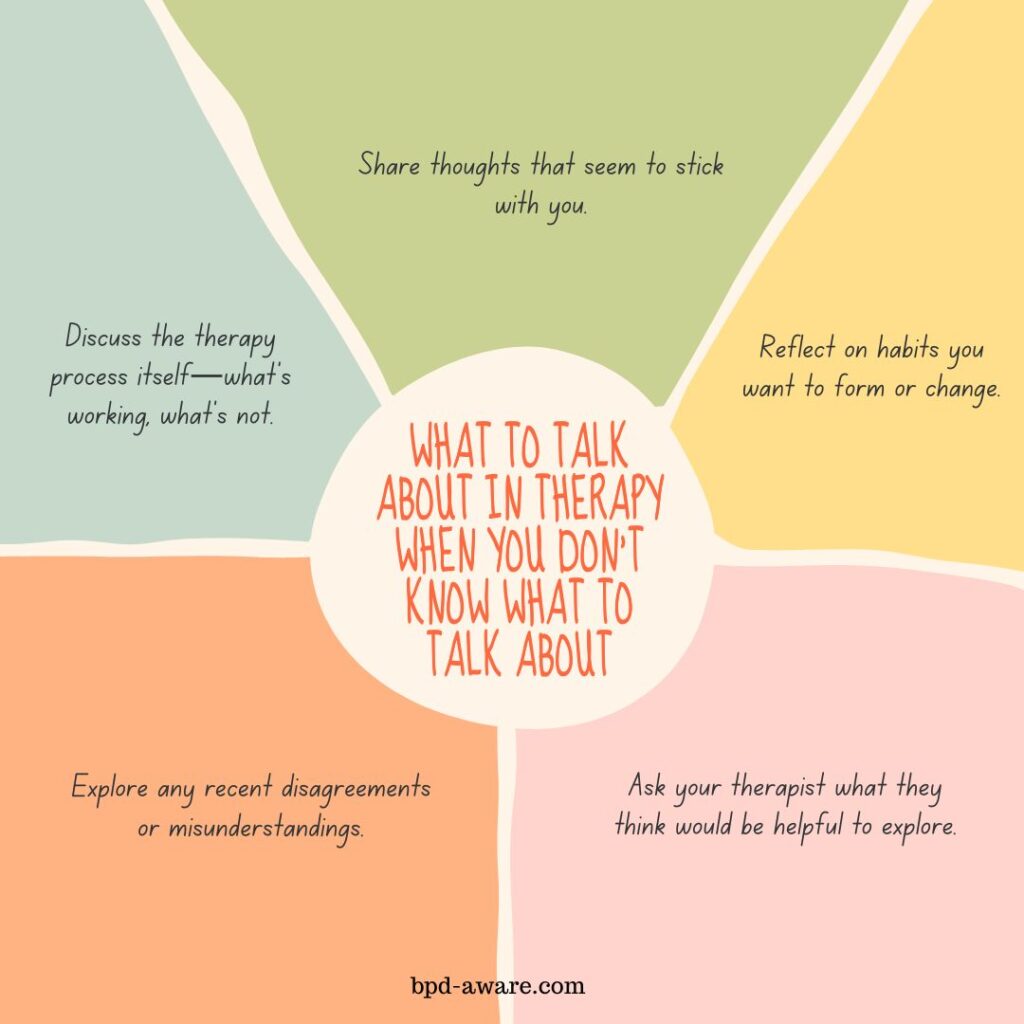Heading into therapy for the first time can be extremely nerve-wracking. It’s normal to be nervous or anxious when you start therapy, especially if you have no previous experience of such treatment. Many people aren’t sure what to expect, how to prepare, what they will talk about, or what will happen during their sessions. This sort of anxiety can cause people with borderline personality disorder (BPD) a great of distress, to the point where they back out of therapy at the last minute.
In this article, we’ll explain what to expect from therapy, especially those early sessions as you begin your journey of recovery. This will include initial feelings you may experience, what to expect when interacting with your therapist, potential emotional reactions to the sessions, what to talk about when you don’t know what to talk about, changes you may experience, realistic expectations, and more.
Initial Feelings Heading Into Therapy
It’s perfectly normal to feel apprehensive about therapy. Not only is it a whole new experience, but you will also have a lot of questions swimming around inside your mind.
You might even start to convince yourself that therapy won’t work for you and it’s pointless even to try. This is a common thought and is a kind of self-defense mechanism designed to protect yourself against change. Change is scary but it’s also necessary to begin the healing process.
Others might feel overwhelmed. When you have BPD, a lot is going on inside your mind and the thought of trying to untangle it all and deal with some uncomfortable issues can be very overwhelming. This can lead to entering your first session feeling drained.
Not everyone feels this way heading into therapy though. Some people feel a sense of relief. Living with BPD is tough and starting therapy represents to beginning of a journey toward healing. The idea that you may begin to start seeing improvements in your life can come as a huge relief.
Of course, the human mind is almost endless in capacity for thoughts, feelings, and emotions. You may feel all of these emotions heading into therapy, and more besides. Those of us with BPD are an emotional bunch and starting therapy can lead to many, many feelings.

Interacting With Your Therapist
Your initial therapy sessions will focus on providing a framework for the rest of your sessions going forward. The therapist will also be aware that you’re likely to feel uncomfortable and nervous heading into those first sessions and take that into consideration.
Your therapist will have questions about your past, your current life, and what you hope to gain from therapy. This helps them to learn how they can better cater to you during future sessions and know what you’ve been through. Talking about your past can be daunting but it usually isn’t done in an in-depth manner during the early stages of therapy.
Having a strong working relationship with your therapist is important, which is why your therapist will work on building rapport with you. This means establishing trust and creating an environment where you feel you can talk to your therapist about whatever is on your mind. This level of rapport doesn’t happen overnight but will hopefully build slowly session after session.
You may be given homework towards the end of a therapy session. This could be something such as keeping a journal of your thoughts and feelings from day to day or working on a skill. This might not happen for the first few sessions but it’s something that’s good to be aware of. Sometimes you may forget to do your homework or realize you don’t fully understand it. It’s normal for this to happen occasionally and your therapist will recognize that.
Emotional Reactions To Therapy
Talking about past events can bring memories and emotions to the surface that you’ve not felt in quite some time. It’s perfectly normal to feel strong emotions during a therapy session including sadness, anger, joy, or relief – depending on what it is you’re talking about. You might laugh, you might cry. You might do both during the same session.
Experiencing this level of emotions in front of someone else can feel a little embarrassing but you don’t need to worry. Part of a therapist’s job is to help you feel comfortable enough to share these emotions and they are certainly used to seeing people in emotional states. Give yourself the freedom to be vulnerable and experience these emotions in a healthy environment.
Part of experiencing these emotions may mean you react in a defensive manner to certain questions or ideas. Again, this is a perfectly normal of the therapeutic process. It can indicate you’re not ready to talk about certain things yet or perhaps another avenue needs to be investigated first. Either way, a therapist will be sensitive to this and not press issues that you’re not ready to talk about.
What To Talk About When You Don’t Know What To Talk About In Therapy
Knowing what to talk about in therapy, especially those first few sessions, can be daunting. Usually, a therapist will guide you through those early sessions and they’ll be quite structured, which does make things a little easier on you. However, as your therapy progresses you may find that the sessions become more open and leave more time for you to talk.
There may be times when you don’t feel you have anything to talk about. But is that really true? Being in therapy doesn’t just mean talking about deeply emotional issues or the bad things in your life. Talking about the good things and the little wins can be just as important.
There are plenty of other things you can talk about too. Maybe you feel really good at the moment. That’s worth exploring with your therapist. What do you think is contributing to how well you feel?
Alternatively, you might feel like there’s so much going on in your life that you’re not able to focus on therapy. Again, that’s something worth exploring. Is there something that could be changed about the timing of your sessions or something you could do in your life to help you regain your focus?
Even the idea that you don’t have anything to talk about is something you can talk about in therapy. Why is it that you have nothing you want to talk about? Is it a sign that things are going well or a sign that things are going badly? Have you become bored with the process? Do you need to change something about your therapy sessions?
Is there something that you’ve previously not talked about because you didn’t think it was important enough to bring up but it’s still on your mind? This is something else that is worth talking about with your therapist.
There will naturally be quiet moments during therapy and times when you don’t know what to say. This is normal. Sometimes a short period of quiet can allow you to collect your thoughts and gather yourself.

Changes You May Experience During Therapy
Change is a vital part of the healing process but change can be scary. Thankfully, a good therapist will do their best to not rush you through the process and allow you to go at your own pace.
Still, even in the earliest sessions, you may begin to see certain changes in your perspective of yourself and how borderline personality disorder affects you. You will also hopefully, as your therapy progresses, begin to learn new skills which help you to cope with your BPD and make strides in your recovery.
You may encounter some internal resistance to these changes. Again, that’s normal. This resistance can manifest itself in a few ways. You may start to believe that therapy isn’t really helping you or that your therapist doesn’t have your best interest at heart. While it’s unfortunately possible to come across a bad therapist or one that you struggle to build a rapport with, this can also be an indicator that you’re resisting change.
You may want to stop attending therapy altogether or continually avoid doing homework, such as practicing coping skills your therapist has taught you.
However, you may also experience a number of positive changes. You may begin to feel more confident and more comfortable about therapy in general. You may feel the skills you’ve been taught in therapy begin to have a positive effect. You might find that you have more energy in your daily life.
There are many changes that can come about through therapy. Usually, they start small and grow from there but some people do experience early breakthroughs. Therapy is a highly individual experience that can be difficult to predict.
Feelings Immediately After A Therapy Session
Immediately after a therapy session, you might feel tired or energized. This can depend on exactly what was talked about during the session or just how you react to the therapeutic environment in general. Because therapy can be highly emotionally charged, it does get the adrenaline pumping through your system at times. This can leave you feeling fantastic while it’s still in your system but can lead to fatigue later on in the day.
It’s natural to go over certain points in the therapy session in your head after you leave. You may think of things you wish you’d said or hadn’t said, or things you should have worded differently. Be careful though not to ruminate and obsess over these things. If there are things you wish to clarify and correct in the next session, write them down somewhere and these can be discussed next time.
You may also find yourself thinking about the past or the future. Something that you brought up in therapy about your past may rattle around inside your head for the next day or two. Or you might think about the future and how the positive changes you’re starting to make.
There will undoubtedly be a lot of thoughts and feelings racing through your mind, especially after your first therapy session when the experience is so new to you. The important thing to remember is that this is perfectly normal and things will likely calm down internally as you become more used to the process.
Final Thoughts
Undergoing therapy is perhaps the best thing you can do to overcome BPD. It can also be one of the scariest. There are a lot of unknowns and uncertainties in your mind when you head to therapy, even when you know how much good it can do for you.
At its best, therapy is a safe space for self-discovery, healing, and growth. While it takes time, effort, and no small degree of bravery, the results can be truly worthwhile.
If you have any questions about starting therapy or anything related to the process, please let us know in the comment box below.
Sources, Resources, and Further Reading
- What to Expect from Therapy: https://www.talkspace.com/blog/what-to-expect-from-therapy/
- Your First Therapy Session: A Survival Guide: https://blog.opencounseling.com/what-to-expect-from-therapy/
- Qualities of a Great Therapist for BPD: https://www.verywellmind.com/what-to-look-for-when-choosing-a-therapist-425212
















